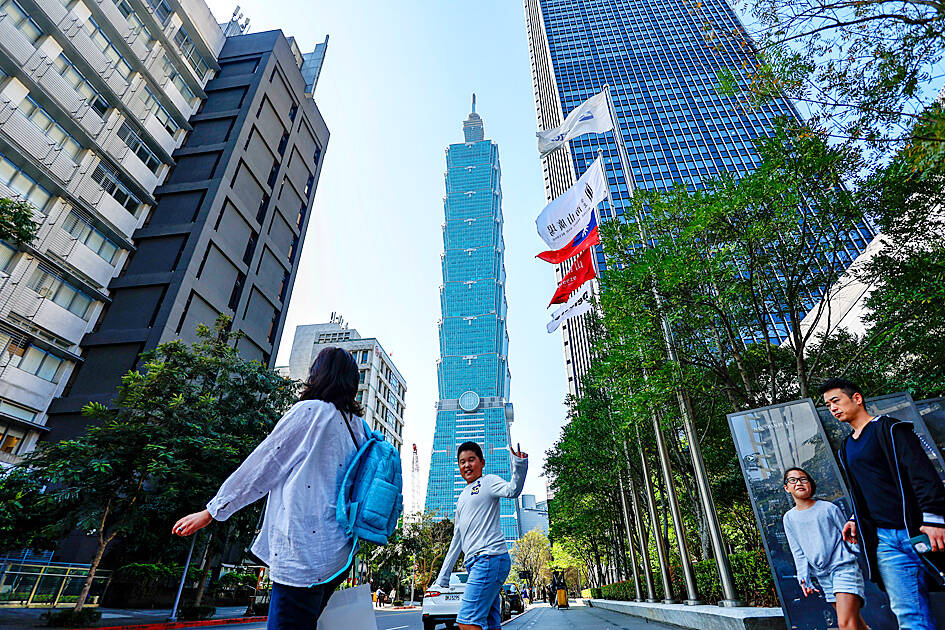Taiwanese businesses, including those operating in China, yesterday urged the Democratic Progressive Party (DPP) to review and revise its policies related to cross-strait relations after winning an unprecedented third consecutive presidential term on Saturday.
Vice President William Lai (賴清德) of the DPP and his running mate, Hsiao Bi-khim (蕭美琴), won the presidential election, receiving 5,586,019 votes, or 40.05 percent of the total, the Central Election Commission said.
Lai defeated the main opposition candidate of the Chinese Nationalist Party (KMT), New Taipei City Mayor Hou You-yi (侯友宜), who won 33.49 percent of the vote, and Taiwan People’s Party Chairman Ko Wen-je (柯文哲), who garnered 26.46 percent.

Photo: Daniel Ceng, EPA-EFE
Association of Taiwan Investment Enterprises on the Mainland president Lee Cheng-hung (李政宏) said that when formulating cross-strait policy, the DPP should remember that more than 8 million people did not vote for them.
“The incoming DPP administration should draw a lesson from this bitter experience [of a majority of voters backing other parties] and present a better policy to help Taiwanese striving for a better life and future,” he said.
Lai has been targeted by the KMT and Beijing for his description of himself as a “pragmatic worker for Taiwanese independence,” although he has sought to walk back that characterization in the past few months.
Noting that cross-strait relations are issues of global concern, Lee stressed the importance of cross-strait peace and stability, saying it has great implications for the global economy.
Tsai Shih-ming (蔡世明), a Taiwanese businessman in Shanghai, said in a telephone interview that the DPP would have no honeymoon period with China after Saturday’s election.
Beijing would judge Lai’s administration by its deeds, not just its words, Tsai said, adding that China holds the cards concerning the resumption of exchanges.
Hander Chang (張致遠), secretary-general of the Hsinchu-based Taiwan Science Park Association of Science and Industry, said that while Taiwan’s trade dependence on the Chinese market has fallen in the past few years, the country remains a large export destination for Taiwanese goods.
An abrupt cooling in cross-strait relations is not in the interests of Taiwan because the nation is small and cross-strait collaboration is of great importance to it, Chang said.
GlobalWafers Co (環球晶圓) chairwoman Doris Hsu (徐秀蘭) said that while the company has expanded its business globally, it hopes that Taiwan can maintain stable engagement with other countries.
Powerchip Semiconductor Manufacturing Co (力積電) chairman Frank Huang (黃崇仁) said that despite Taiwan’s strength in the global semiconductor supply chain, it still needs to talk with China given the huge Chinese market.
“Taiwan could not completely rely on the US. It should deal with China and maintain peace across the strait,” Huang said.

The US dollar was trading at NT$29.7 at 10am today on the Taipei Foreign Exchange, as the New Taiwan dollar gained NT$1.364 from the previous close last week. The NT dollar continued to rise today, after surging 3.07 percent on Friday. After opening at NT$30.91, the NT dollar gained more than NT$1 in just 15 minutes, briefly passing the NT$30 mark. Before the US Department of the Treasury's semi-annual currency report came out, expectations that the NT dollar would keep rising were already building. The NT dollar on Friday closed at NT$31.064, up by NT$0.953 — a 3.07 percent single-day gain. Today,

‘SHORT TERM’: The local currency would likely remain strong in the near term, driven by anticipated US trade pressure, capital inflows and expectations of a US Fed rate cut The US dollar is expected to fall below NT$30 in the near term, as traders anticipate increased pressure from Washington for Taiwan to allow the New Taiwan dollar to appreciate, Cathay United Bank (國泰世華銀行) chief economist Lin Chi-chao (林啟超) said. Following a sharp drop in the greenback against the NT dollar on Friday, Lin told the Central News Agency that the local currency is likely to remain strong in the short term, driven in part by market psychology surrounding anticipated US policy pressure. On Friday, the US dollar fell NT$0.953, or 3.07 percent, closing at NT$31.064 — its lowest level since Jan.

The New Taiwan dollar and Taiwanese stocks surged on signs that trade tensions between the world’s top two economies might start easing and as US tech earnings boosted the outlook of the nation’s semiconductor exports. The NT dollar strengthened as much as 3.8 percent versus the US dollar to 30.815, the biggest intraday gain since January 2011, closing at NT$31.064. The benchmark TAIEX jumped 2.73 percent to outperform the region’s equity gauges. Outlook for global trade improved after China said it is assessing possible trade talks with the US, providing a boost for the nation’s currency and shares. As the NT dollar

The Financial Supervisory Commission (FSC) yesterday met with some of the nation’s largest insurance companies as a skyrocketing New Taiwan dollar piles pressure on their hundreds of billions of dollars in US bond investments. The commission has asked some life insurance firms, among the biggest Asian holders of US debt, to discuss how the rapidly strengthening NT dollar has impacted their operations, people familiar with the matter said. The meeting took place as the NT dollar jumped as much as 5 percent yesterday, its biggest intraday gain in more than three decades. The local currency surged as exporters rushed to